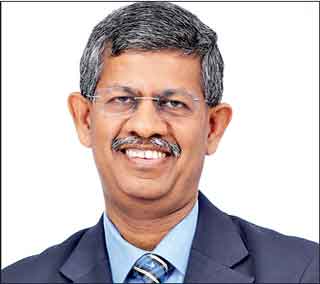Sunday Feb 15, 2026
Sunday Feb 15, 2026
Thursday, 22 September 2022 00:00 - - {{hitsCtrl.values.hits}}
At a recent webinar on mediation and business efficacy, Ceylon Chamber of Commerce Secretary General and CEO Manjula de Silva stressed that settling business disputes through mediation, rather than arbitration or litigation, will strengthen Sri Lanka’s ease of doing business and potentially lead to
 |
| Ceylon Chamber of Commerce Secretary General and CEO Manjula de Silva |
 |
| CCC-ICLP International ADR Centre Director Shehara Varia |
increased international investments.
Business efficacy means the ability of a business to produce intended results. Businesses are made on contracts of different types, i.e., contracts for supplies, services, or employment, or on agreements such as non-disclosure, partnerships, leases, or indemnity. Successful execution of these contracts and agreements directly impacts the success of the business.
Disputes ranging from employer-employee disagreements to breaches of contracts can consume precious time and money, harm business relationships and reputations, and reduce the ability of businesses to produce intended results. In some cases, disputes can cause businesses to close. As such, it is critical that businesses are aware of the most suitable methods of dispute resolution to adopt when they encounter disputes.
De Silva says that effective and efficacious dispute resolution in businesses is vital not only for individual business success, but as a critical element in inviting foreign investors to Sri Lanka.
Businesses tend to invest in countries where it is easy to do business. Sri Lanka is ranked 90 as at 2021 in the Ease of Doing Business Index from among 190 countries; however, when it comes to enforcing contracts, Sri Lanka ranks at 164 out of 190 countries. Implementing effective and efficacious dispute resolution methods for business contracts could positively impact this score and attract more investors. As such, de Silva said that the business community must try to explore mediation as a first step in dispute resolution prior to resorting to arbitration or litigation, as they can increase efficacy of business.
De Silva noted that opting for litigating disputes has caused some damage to businesses. It consumes precious money and time which could otherwise be invested in the business. Due to the delays in resolving disputes through litigation, businesses often encounter serious financial hardship and see the breakdown of business relationships.
The Ceylon Chamber of Commerce (CCC) and the Institute for the Development of Commercial Law and Practice (ICLP) jointly established the CCC-ICLP International ADR Centre in Sri Lanka to provide alternative dispute resolution services to the Sri Lankan business community. Commercial mediation is a widely practiced and accepted method of dispute resolution around the world and has proven to be an extremely effective and efficient mode of dispute resolution. Adopting this method will help to strengthen the contract enforcement rankings of Sri Lanka and enhance business efficacy.
CCC-ICLP International ADR Centre Director Shehara Varia explained that mediation is a facilitated negotiation through which the parties to the dispute are encouraged to arrive at an amicable settlement. She suggested that the business community should use its negotiation experts to think of creative ways to resolve business disputes, rather than use fault-focused litigation and arbitration. The focus should be win-win rather than win-lose. In the long run, this saves time, money, and relationships and paves the way for future cooperation.
Varia further explained that trained, professional mediators can conduct successful negotiations that avert communication gaps and high emotions. Since mediation focuses on business interests and avoids attributing fault, it encourages parties to think out of the box, benefit from each other’s strengths and opportunities, and arrive at an amicable settlement favourable to both parties.
Mediation agreements are enforceable as contracts and international mediation agreements can be enforced through the United Nations Convention on International Settlement Agreements Resulting from Mediation (also known as the Singapore Mediation Convention) which was adopted on 20 December 2018. Although Sri Lanka is a party to the Convention, it is yet to give effect to this convention through domestic legislation.
Varia also spoke about hybrid dispute resolution where businesses use mediation, arbitration, and litigation in a mixed method. Even if a matter is not fully settled through mediation, a successful mediation can help parties rebuild their relationships through facilitated, effective communication that clearly identifies the disputed areas. This narrows down the matters that need to either be resolved through litigation or adjudicated or arbitrated by an expert.
Mediation can be tried at any point of the dispute resolution process, from when the dispute occurs to when a case is pending in court or arbitration. International experience suggests that compliance rates are higher in mediated settlements, which Varia noted saves reputations, resources, and relationships.
(This article is excerpted from a webinar on “Mediation and Business Efficacy” featuring Ceylon Chamber of Commerce Secretary General Manjula de Silva and the Director of the CCC-ICLP International ADR Centre, Shehara Varia. This webinar was supported through the U.S. Agency for International Development’s Efficient and Effective Justice Activity. To learn more about how businesses can obtain commercial mediation services, visit the CCC-ICLP International ADR Centre at https://icadrp.com.)